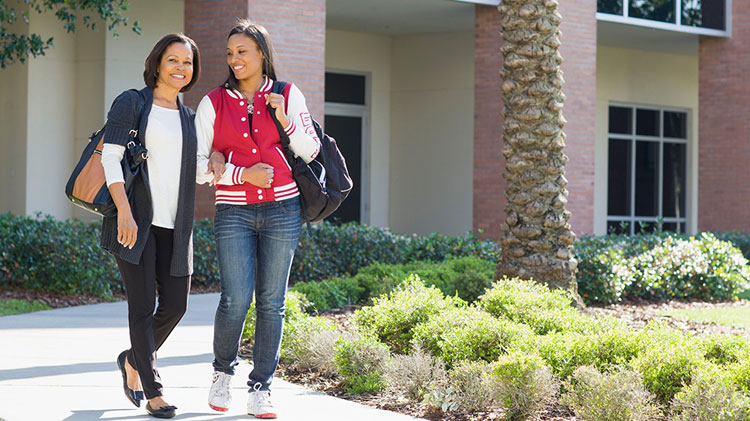Preparing for college in high school
Track the key steps you and your high schooler should consider when preparing for college.
About 3.4 million high school students were estimated to graduate in 2022. If your child is considering post-secondary education, knowing how to prepare for college in high school can get both of you ready. Use this chronological college checklist to stay ahead of key steps, including school visits and financial aid deadlines, and help smooth the road to higher learning.
- Lay the groundwork
By 9th and 10th grade you and your student should be discussing life after high school. Encourage a visit with the school counselor and/or any interests and skills assessment, as well as internships, apprenticeships, job shadowing and summer programs to explore possibilities and gain experience. - Investigate the options
Start a running list of your student's favorite schools or programs. Research and contact each to learn more about what makes the experience and education distinctive. Attend college visits and career fairs. Plan visits to campuses — even neighboring schools that aren't on your top list of favorites can help you choose the right college. - Take the tests
Not every school or program requires standardized tests, but taking them keeps options open. The PSAT, usually taken in the fall of junior year, serves as practice for the SAT. Spring of junior year is typical ACT and SAT time. Some college hopefuls try for an improved score in the fall of senior year. Many colleges accept either the ACT or SAT, so determine which presents your student best by taking practice tests. - Apply for scholarships
A good summer project before senior year is researching and applying for local and national scholarships. They're available for a range of reasons — from involvement in extracurricular activities to academic performance. Avoid scams by remembering that you should never have to pay to find them. - Perfect those applications
First thing senior year, your student should begin requesting teacher recommendations and writing and revising application essays. Early-decision and early-action applications are typically due in November, and the deadline for regular college applications is normally January 1 to February 1. Other programs, including trade and technical schools, may have later deadlines — mark them on the calendar. - Apply for financial aid
The Free Application for Federal Student Aid (FAFSA), which determines the need for billions of dollars to millions of students yearly, is available beginning October 1. Apply early, as some funds are first come, first served. Some schools may require you to fill out the College Board's CSS Profile instead, a more detailed application than the FAFSA. - Compare colleges
- Ask a lot of questions — Any search should begin by gathering information from schools and other sources and include an in-depth review of the type of person your teenager is.
- Discuss the cost of college — There are a lot of cost considerations to discuss in addition to tuition, room and board; it’s helpful to discuss as many as you can.
- Explore a variety of universities and campuses — It’s one thing for a kid to say, “I want to go to a small school.” It’s another thing to actually visit institutions with different enrollment sizes and compare the experiences, such as classroom sizes and housing.
- Seek help — Your student may have a viewpoint that contrasts with your own experiences and ideas. Bridging the gap can be easier with the input of experts, such as guidance counselors and professional academic advisors, who can offer impartial guidance on how to choose the right college.
- Choosing the right college
Once your student receives acceptance letters, make any necessary financial comparisons and loan applications to inform your final decision. Send in your acceptance and deposit by the required due date — typically May 1. Don't forget to let schools you're not choosing know that you're declining their offer of admission. - Prep for the next phase
There may be forms to fill out, classes to register for and perhaps new living arrangements. Your student's chosen school or program will keep you posted as both of you navigate the launch into this new adventure, in education and life.




